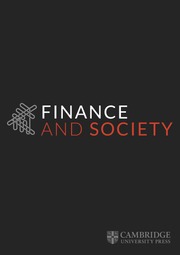Crossref Citations
This article has been cited by the following publications. This list is generated based on data provided by Crossref.
Samman, Amin
and
Konings, Martijn
2023.
Edges of the financial imagination.
Finance and Society,
Vol. 9,
Issue. 1,
p.
54.


